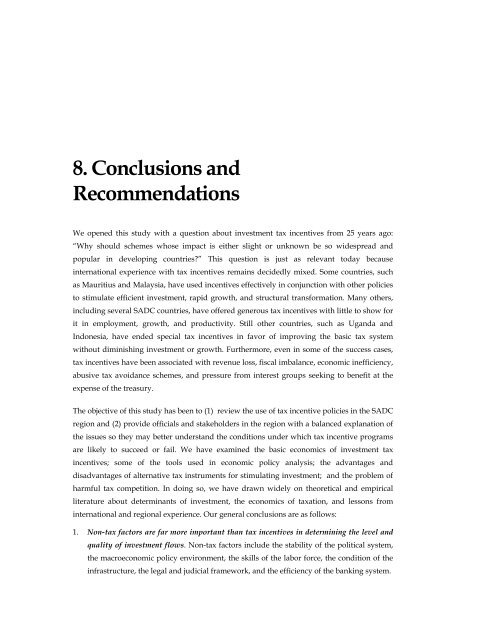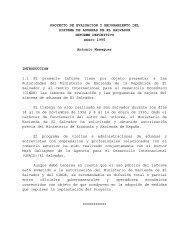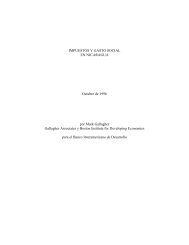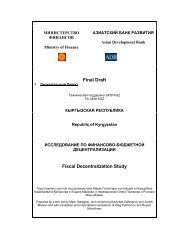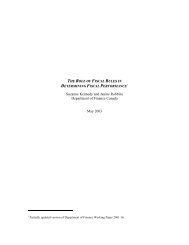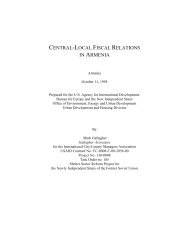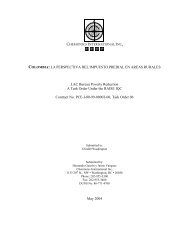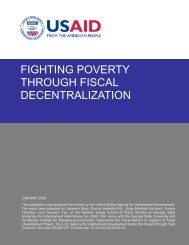Effectiveness and Economic Impact of Tax Incentives in the SADC ...
Effectiveness and Economic Impact of Tax Incentives in the SADC ...
Effectiveness and Economic Impact of Tax Incentives in the SADC ...
You also want an ePaper? Increase the reach of your titles
YUMPU automatically turns print PDFs into web optimized ePapers that Google loves.
8. Conclusions <strong>and</strong><br />
Recommendations<br />
We opened this study with a question about <strong>in</strong>vestment tax <strong>in</strong>centives from 25 years ago:<br />
“Why should schemes whose impact is ei<strong>the</strong>r slight or unknown be so widespread <strong>and</strong><br />
popular <strong>in</strong> develop<strong>in</strong>g countries?” This question is just as relevant today because<br />
<strong>in</strong>ternational experience with tax <strong>in</strong>centives rema<strong>in</strong>s decidedly mixed. Some countries, such<br />
as Mauritius <strong>and</strong> Malaysia, have used <strong>in</strong>centives effectively <strong>in</strong> conjunction with o<strong>the</strong>r policies<br />
to stimulate efficient <strong>in</strong>vestment, rapid growth, <strong>and</strong> structural transformation. Many o<strong>the</strong>rs,<br />
<strong>in</strong>clud<strong>in</strong>g several <strong>SADC</strong> countries, have <strong>of</strong>fered generous tax <strong>in</strong>centives with little to show for<br />
it <strong>in</strong> employment, growth, <strong>and</strong> productivity. Still o<strong>the</strong>r countries, such as Ug<strong>and</strong>a <strong>and</strong><br />
Indonesia, have ended special tax <strong>in</strong>centives <strong>in</strong> favor <strong>of</strong> improv<strong>in</strong>g <strong>the</strong> basic tax system<br />
without dim<strong>in</strong>ish<strong>in</strong>g <strong>in</strong>vestment or growth. Fur<strong>the</strong>rmore, even <strong>in</strong> some <strong>of</strong> <strong>the</strong> success cases,<br />
tax <strong>in</strong>centives have been associated with revenue loss, fiscal imbalance, economic <strong>in</strong>efficiency,<br />
abusive tax avoidance schemes, <strong>and</strong> pressure from <strong>in</strong>terest groups seek<strong>in</strong>g to benefit at <strong>the</strong><br />
expense <strong>of</strong> <strong>the</strong> treasury.<br />
The objective <strong>of</strong> this study has been to (1) review <strong>the</strong> use <strong>of</strong> tax <strong>in</strong>centive policies <strong>in</strong> <strong>the</strong> <strong>SADC</strong><br />
region <strong>and</strong> (2) provide <strong>of</strong>ficials <strong>and</strong> stakeholders <strong>in</strong> <strong>the</strong> region with a balanced explanation <strong>of</strong><br />
<strong>the</strong> issues so <strong>the</strong>y may better underst<strong>and</strong> <strong>the</strong> conditions under which tax <strong>in</strong>centive programs<br />
are likely to succeed or fail. We have exam<strong>in</strong>ed <strong>the</strong> basic economics <strong>of</strong> <strong>in</strong>vestment tax<br />
<strong>in</strong>centives; some <strong>of</strong> <strong>the</strong> tools used <strong>in</strong> economic policy analysis; <strong>the</strong> advantages <strong>and</strong><br />
disadvantages <strong>of</strong> alternative tax <strong>in</strong>struments for stimulat<strong>in</strong>g <strong>in</strong>vestment; <strong>and</strong> <strong>the</strong> problem <strong>of</strong><br />
harmful tax competition. In do<strong>in</strong>g so, we have drawn widely on <strong>the</strong>oretical <strong>and</strong> empirical<br />
literature about determ<strong>in</strong>ants <strong>of</strong> <strong>in</strong>vestment, <strong>the</strong> economics <strong>of</strong> taxation, <strong>and</strong> lessons from<br />
<strong>in</strong>ternational <strong>and</strong> regional experience. Our general conclusions are as follows:<br />
1. Non-tax factors are far more important than tax <strong>in</strong>centives <strong>in</strong> determ<strong>in</strong><strong>in</strong>g <strong>the</strong> level <strong>and</strong><br />
quality <strong>of</strong> <strong>in</strong>vestment flows. Non-tax factors <strong>in</strong>clude <strong>the</strong> stability <strong>of</strong> <strong>the</strong> political system,<br />
<strong>the</strong> macroeconomic policy environment, <strong>the</strong> skills <strong>of</strong> <strong>the</strong> labor force, <strong>the</strong> condition <strong>of</strong> <strong>the</strong><br />
<strong>in</strong>frastructure, <strong>the</strong> legal <strong>and</strong> judicial framework, <strong>and</strong> <strong>the</strong> efficiency <strong>of</strong> <strong>the</strong> bank<strong>in</strong>g system.


